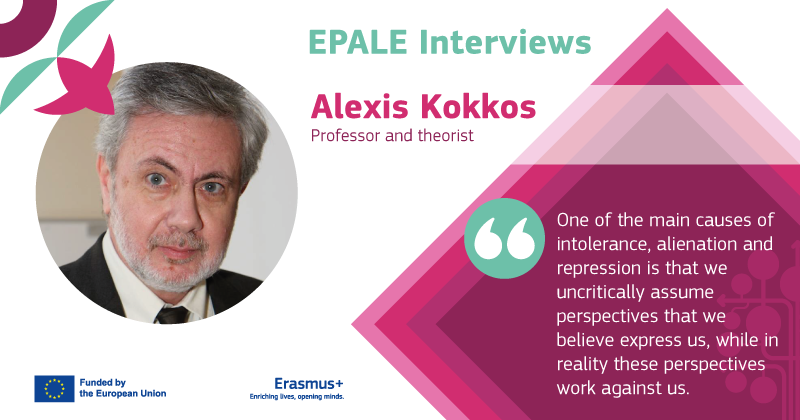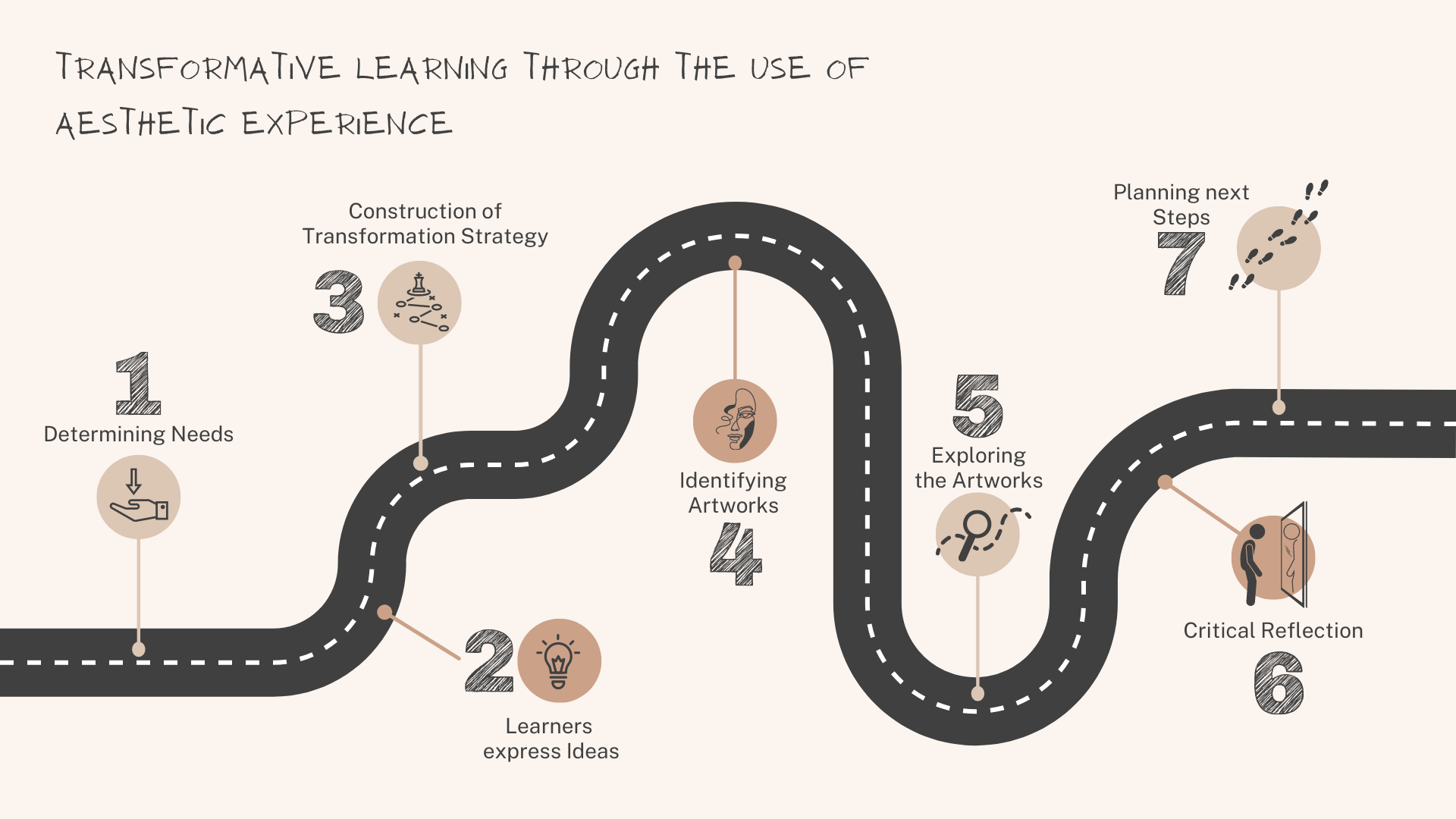EPALE interview: Prof Alexis Kokkos - Transformative Learning through Art

Alexis Kokkos is an emeritus professor and theorist. He was responsible for the postgraduate programme of Adult Education at the Hellenic Open University. He is the chairperson of the Hellenic Adult Education Association and creator of the method “Transformative Learning through Aesthetic Experience”, which uses works of literature, theatre, music, movies, and dance to encourage the development of critical and creative thinking of the learners.
Could you introduce us to the method “Transformative Learning through Aesthetic Experience” you have developed?
The theoretical background of “Transformative Learning through Aesthetic Experience” stems from the idea of emancipatory and art-based learning, which allows us to critically reflect on our assumptions and broaden the way we understand ourselves and the world. This view is shared by many major scholars, such as Aristotle, T. Adorno, H. Marcuse, P. Freire, J. Dewey, P. Cranton, M. Greene, and many others. These scholars highlighted that significant works of art denounce the taken-for-granted ideas and meanings, and capture the insight of a different and alternative social reality. They also capture the idea that the established state of affairs should be transformed. However, in the literature on emancipatory learning, there is a lack of educational methods that can deal with the development of perspective transformation through the use of art.
“Transformative Learning through Aesthetic Experience” method, drawing from the ideas of the aforementioned scholars, comprises seven stages:
- First Stage: Determining the need for transformative learning - this stage involves the exploration and determination of the participants’ need for critically assessing their taken-for-granted problematic assumptions. An educator might take an initiative to facilitate a transformative learning process with participants´ agreement.
- Second Stage: Participants express their ideas - by receiving their answers, the educator takes into account their opinions needed to formulate an appropriate strategy for the development of the critical reflection on the topic.
- Third Stage: Constructing a transformational strategy – at this crucial stage, the educator, firstly, analyses the participants’ assumptions (formulated in the previous stage) and accordingly, taking into consideration participants’ interests, assumptions and time frame, formulates critical questions that will serve as triggers for the exploration of participants’ assumptions.
- Fourth Stage: Identifying works of art as incentives for critical reflection - the educator in collaboration with the learning group together selects appropriate works of art that could serve as triggers for exploring the critical questions.
- Fifth Stage: Exploring the artworks and critical questions - the educator together with the participants explore the meaning of the artworks, draw insights, and link them with the critical questions.
- Sixth Stage: Critically reflecting on assumptions - the educator facilitates a process throughout which the participants reflect on their insights resulting from the experience that occurred through the previous stages of exploring artworks and critical questions. Then, participants engage in a deeper and more critical reconsideration of their initial taken-for-granted assumptions.
- Seventh Stage: Defining and applying next steps - the educator discusses with the learner certain actions aiming at the continuance of their transformative pathway (e.g., creating self-directed peer groups, setting up common projects).

How would you differentiate between works of art that have value, and other works of art, that might not have a particular significance, e.g. newspaper comics?
We choose works of art that could inform us deeper about the issue and provoke our feelings. Think about films, theatrical plays, or poems that after viewing you still think about and put yourself in a state of exploration. The ideal for using a piece of art would be to avoid clichés and look for something that is questioning our belief system.
How can culture in return benefit from transformative learning?
My definition of transformative learning is a kind of learning through which we challenge our taken-for-granted, dysfunctional ideas and assumptions, and then we can take relevant emancipatory actions. In my understanding, culture is the way we think, feel and act in everyday life. However, often, this way of thinking, feeling, and acting is colonised by taking for granted stereotypical dysfunctional assumptions.
One of the main causes of intolerance, alienation and repression is that we uncritically assume perspectives that we believe express us, while in reality these perspectives work against us, e.g. majority population of Russia thinks that war in Ukraine is a positive thing - people believe that this expresses their interests, but, in reality, this situation is against their interests. This illustrates a socio-cultural reality that is determined by fundamentalism, discriminative and populist mentality, as well as apathy towards the common good.
How can we use the transformative learning approach to foster our shared values in the EU?
It is possible to conduct a transformative learning process by a person alone, but it is a very difficult task. A learning group setting and a facilitator would help to exchange ideas and good practices and pose challenging questions in an open dialogue. A transformative educator mustn't impose their views on the learner.
Another important aspect would be to think about the quality of the learning process itself. Educational or learning institutions should function as focal points where people can meet, communicate, share concerns, participate in democratic processes and thereby become more open to diversity. Adult education settings and University classes and lectures can be a microcosm where learners experience the principles and processes of democracy, justice, fairness, caring, inclusion, critical way of thinking, and sustainable development, and finally, apply these principles in their everyday life. When people experience a critical viewpoint on these issues, transformative learning contributes to the rethinking and reconsidering of the taken-for-granted assumptions coming closer to the ideals of the EU.
Would that also support the European endeavours to foster active citizenship?
Active citizenship can be fostered to the extent that the dialogue within transformative learning processes has several distinctive characteristics, e.g., participants look for a common understanding. Democratic dialogue is not about a winning argument, but about a final common decision - a synthesis of all views and opinions, regardless of one’s hierarchy or position on the matter. These processes enhance social awareness and civic engagement - which cultivate values of tolerance, solidarity, social justice, inclusiveness, and sustainable development. We should orient ourselves on the best practice examples with passionate and relatable facilitators engaging with critical questions and reflective dialogue.
This interview has been conducted by Christin Cieslak of the EAEA.






les visites interprétatives
J'associe en quelque sorte cette méthode aux visites guidées interprétatives des expositions de musées et aux idées de Freeman Tilden. Il s'agit de transformer une visite de musée en une expérience personnelle. Une telle expérience donne à réfléchir et peut contribuer au changement intérieur d'un individu.